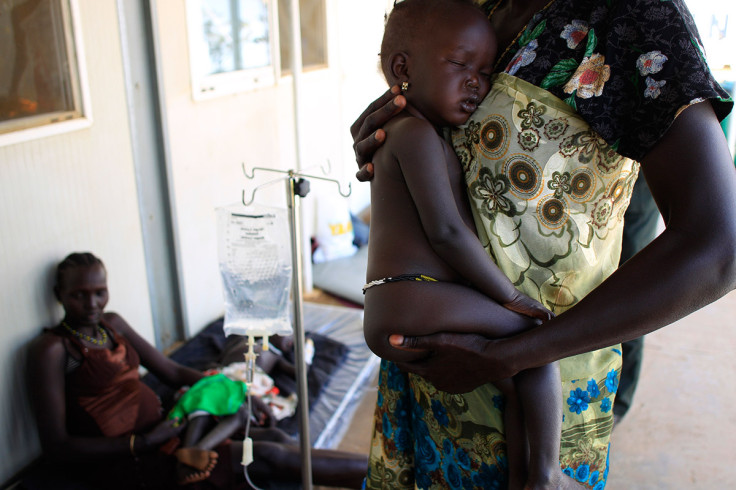Midwives in Sudan are facing food shortages, attacks on hospitals and a lack of electricity
Around 219,000 pregnant women are living in Khartoum – the epicentre of the Sudan conflict. Attacks on hospitals and healthcare facilities have made for a lack of medical resources and staff shortages.

After weeks of fighting, between the Sudanese Army and the paramilitary Rapid Support Forces (RSF) in Sudan, pregnant women are bearing the consequences. In the capital, Khartoum, pregnant women are facing perilous conditions and a lack of healthcare resources.
Prior to the conflict, Sudan was already one of the world's most impoverished countries – including the fact that Sudan has been recognised by the World Health Organisation (WHO) as one of the 18 hunger hotspots across the globe.
Laila Baker, the Regional Director of the UN Population Fund (UNFPA), recalled: "We are acutely concerned... There is no way we can monitor them, there is no access to safe delivery services, [and] no way to ensure even meagre communication. In addition, women can go into premature delivery, and complications can arise from panic."
The brutal conflict has killed more than 500 people. The civil feud has also forced over 450,000 people out of their homes, in order to seek refuge elsewhere. People have fled to other regions either within the country, or across the border to neighbouring countries like the Central African Republic, Chad, Egypt, Ethiopia, and South Sudan.
Many people who have fled Sudan, have already been displaced several times in the past - due to political instability, humanitarian crises, and extreme weather events.
In the epicentre of the conflict, Khartoum, only one in four emergency health facilities are fully operational. There have been numerous attacks on hospitals, medical staff, and ambulances. Most of the hospitals and healthcare units are damaged, or only partially functioning.
UNFPA condemns the attack on a maternity hospital in Khartoum yesterday, which underscores the horrific toll the fighting is exacting on Sudan’s women and families.
— S Vijay Kumar (@Svijaykumar2030) May 6, 2023
The health sector in Sudan has been pushed "to the brink of collapse", said the UNFPA. This is due to the widespread looting of scarce medical supplies, in addition to fuel, water, food, and electricity. The lack of medical and emergency assistance has left over one million pregnant women without access to essential and urgent resources.
The UNFPA estimates that there are currently 1.1 million women who are pregnant in Sudan and that 29,000 are expected to give birth amid the conflict this month (June 2023). The UNFPA also estimates that out of the 1.1 million pregnant women in the country, 219,000 of those women are living in Khartoum.
Jamila, a midwife working in a UNFPA-supported health centre in Khartoum, revealed: "We have a severe lack of supplies in Khartoum, especially oxytocin and umbilical clips."
"Although services continue for the time being, we are praying for more supplies to arrive soon," Jamila added.
The UN reported that despite "the catastrophic circumstances, those hospitals and health centres still functioning – and standing – are proving to be a lifeline for pregnant women and new mothers". Nevertheless, essential medical items are running dangerously low. These medical necessities include blood, oxygen, and fuel for ambulances.
Sudan Maternity Hospital Fights To Save Lives Under Firehttps://t.co/dYFwLV8X1m pic.twitter.com/TRUqM8mmYF
— Channels Television (@channelstv) May 7, 2023
Supporting these women, are community midwives and skilled birth attendants, trained by UNFPA. The reproduction staff are regularly providing women with medical assistance by making home visits. Due to the lack of access to a fully functioning facility, thousands of women are giving birth in their homes.
Since 2021, UNFPA has succeeded in training more than 450 midwives, who are currently working in remote communities, and delivering high-quality maternal health assistance.
In the Jabal Awliya Village in Khartoum State, the fighting has severely impacted access to reproductive health care services.
Saadya, a midwife working in Jabal Awliya, told reporters: "We have designated phone numbers to receive requests for home births, and a midwife goes to perform the delivery... We are able to accept all requests for now."
The UNFPA concluded that, although they will remain consistent with assisting safe births and supporting the women and girls in Sudan, "The recent violence and attacks on health centres are a violation of international law and the right to health."
© Copyright IBTimes 2025. All rights reserved.





















